What If We Never Needed Sleep?
The Science of Sleep
Sleep is a strange thing when you think about it. Every night, we willingly lose consciousness for hours, unable to do anything productive. The average human spends a third of their life asleep, that’s about 25-30 years of unconsciousness!
Could we engineer our biology to stay awake 24/7 and unlock more hours in the day? No more groggy mornings or lost hours, just a continuous, fully awake existence. If evolution is about survival, why would nature design a system that forces us to be inactive for a third of our lives?
At first, it sounds like science fiction. However, some genetic mutations, cutting-edge neuroscience, and military research suggest that a sleepless future might not be impossible.
Why Do We Need Sleep in the First Place?
The Brain’s Cleaning Crew
Your brain is always working, processing information, solving problems, and keeping your body running. But just like a factory produces waste as it operates, so does your brain. This is where the glymphatic system comes in, it’s your brain’s built-in cleaning service.
The glymphatic system is a network of fluid-filled channels that remove toxic waste using cerebrospinal fluid (CSF), a clear liquid that surrounds the brain and spinal cord.
Throughout the day, your brain accumulates waste products like beta-amyloid, a sticky protein linked to Alzheimer’s disease. During sleep, the glymphatic system becomes 10 times more active, flushing out these toxins and keeping the brain healthy.
If we never slept, our brains would slowly clog up with waste, leading to memory loss, confusion, and eventually neurodegenerative diseases.
Think of sleep as your brain’s overnight housekeeping service, skip it, and things start to pile up!
The Body’s Internal Clock - Circadian Rhythm
Ever noticed how you feel sleepy at night and awake in the morning, even without an alarm? That’s because of your circadian rhythm, a built-in biological clock that regulates sleep, metabolism, and hormone release over a 24-hour cycle.
The circadian rhythm is controlled by the Suprachiasmatic Nucleus (SCN), a small region in the brain that responds to light and darkness.
Exposure to sunlight triggers the SCN to reduce melatonin which is your sleep hormone and increases cortisol which keeps you alert.
The SCN tells the brain to produce melatonin, making you feel drowsy.
If we hacked biology to eliminate sleep, we’d have to reprogram the circadian rhythm entirely, otherwise, we’d still feel tired at night, even if we didn’t need sleep.
Sleep and Memory
Every day, your brain absorbs a massive amount of information, but only some of it gets stored as long-term memory. Sleep is essential for sorting and strengthening these memories.
Memory consolidation is the process where the brain strengthens neural connections called synapses during deep sleep, transferring short-term memories into long-term storage.
Studies show that students who sleep after studying retain information better than those who pull all-nighters. Even short naps boost learning!
If we never slept, we’d struggle to retain knowledge, solve problems, or make decisions effectively.
Think of sleep as your brain’s ‘Save’ button, without it, important data gets lost.
Sleep and the Immune System
Sleep isn’t just about the brain, it’s vital for your body, too. Every night, your body repairs tissues, fights infections, and strengthens the immune system.
During deep sleep, the immune system produces cytokines, proteins that help fight infections and inflammation.
People who don’t sleep enough are more prone to colds, flu, and even long-term conditions like heart disease. Just one night of sleep deprivation can reduce your immune defenses by up to 70%!
If we eliminated sleep, we’d need a way to replace this repair process or we’d constantly be sick.
Humans have attempted to test the limits of sleep deprivation with surprising and sometimes terrifying results.
Randy Gardner’s 11-Day No-Sleep Experiment (1964)
A 17-year-old student, Randy Gardner, stayed awake for 264 hours (11 days) for a science fair project.
By day 3, he was irritable and had trouble focusing.
By day 5, he started hallucinating, believing he was a famous football player.
By day 10, he couldn't remember basic facts and experienced micro-sleeps (seconds-long blackouts).
Despite his extreme sleep deprivation, he fully recovered after a long sleep suggesting that the body can bounce back, but only to a limit.
What Happens When Sleep Fails?
Not everyone sleeps normally. Certain disorders reveal just how essential sleep is to survival.
Fatal Familial Insomnia – When Sleep Becomes Impossible
Fatal Familial Insomnia (FFI) is a rare, incurable genetic disorder that destroys the brain’s ability to regulate sleep. Caused by a mutation in the PRNP gene, it leads to progressive insomnia, hallucinations, and eventually organ failure. As the disease worsens, patients enter a state of total sleep deprivation, which proves fatal within months to a few years. FFI underscores that sleep isn’t just restorative, it’s essential for survival, as the brain and body cannot function without it.
Narcolepsy – When Dreams Intrude Upon Reality
Narcolepsy is a chronic sleep disorder marked by overwhelming daytime drowsiness and sudden sleep attacks. Individuals with narcolepsy may experience cataplexy, a sudden loss of muscle tone triggered by strong emotions, leading to weakness or collapse. This condition is linked to the loss of hypocretin-producing neurons in the brain, which play a crucial role in regulating wakefulness and REM sleep.
Could Science Eliminate Sleep?
Keep reading with a 7-day free trial
Subscribe to Science Sundays to keep reading this post and get 7 days of free access to the full post archives.


